Editor’s Note: Call to Earth is a CNN editorial series committed to reporting on the environmental challenges facing our planet, together with the solutions. Rolex’s Perpetual Planet initiative has partnered with CNN to drive awareness and education around key sustainability issues and to inspire positive action.
Golf courses, despite occupying large green spaces, are not necessarily good for the environment. Land is often cleared to make way for a fairway and maintaining the pristine turf often requires a lot of water, regular mowing and the spraying of fertilizers and pesticides – none of which is good for biodiversity.
In the US, with the number of course closures outweighing new openings every year since 2006, some are questioning how we should use these huge spaces – and asking whether, instead of golf, nature should be left to run its course.
Conservation nonprofits and local authorities are looking to acquire golf courses that have been abandoned due to high maintenance costs, low player numbers or other reasons, and repurpose them into landscapes that boost biodiversity and build natural defenses against climate change.
These spaces provide “huge opportunities from a conservation perspective,” says Guillermo Rodriguez, California state director of The Trust for Public Land (TPL), a conservation organization which is rewilding three of the state’s former courses.
“It’s a multiple win,” he continues. “You increase public access by taking former private golf courses (and) turning them into public properties … (you return) water back into rivers and streams and create a better habitat for the endangered species that we have in California.”
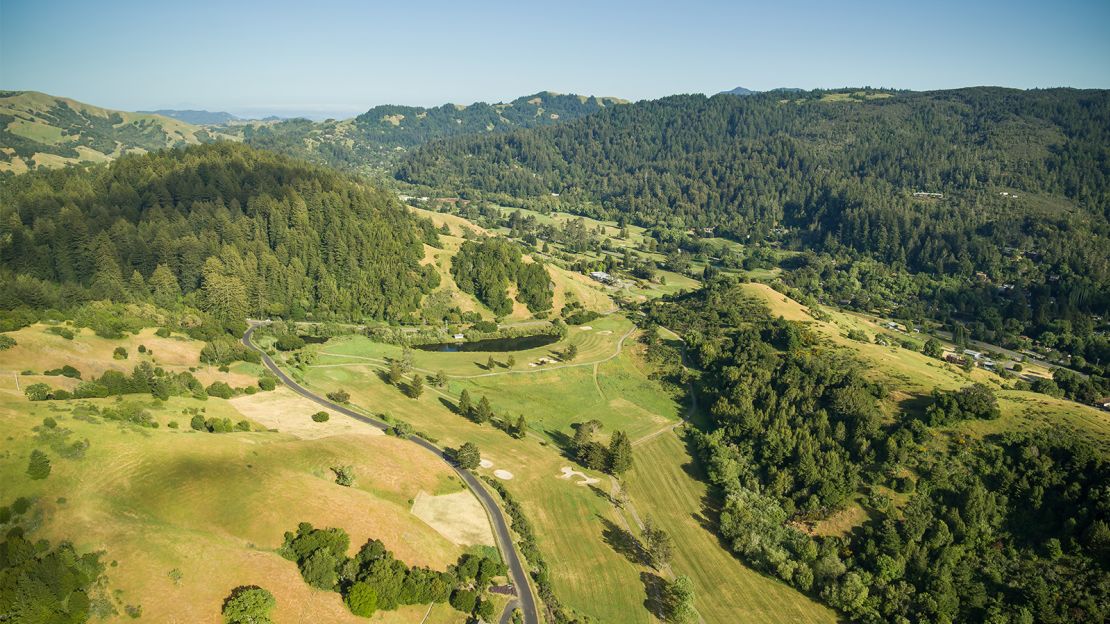
San Geronimo, California
Take San Geronimo, an 18-hole course in northern California’s Marin County, located on two waterways, which are home to endangered coho salmon and steelhead trout. Since the course’s construction in 1965, much of the water from San Geronimo and Larsen Creek was being diverted to provide irrigation for the course, affecting fish populations in the area, says Rodriguez.
In 2018, TPL purchased the 157-acre site and began converting the area back into its natural state: turning off the irrigation, removing culverts and dams built to capture water and starting to restore the habitat by planting native species. According to TPL, the rewilding process could take up to 10 years, but there are signs that wildlife is already bouncing back, with bobcats spotted roaming the area.
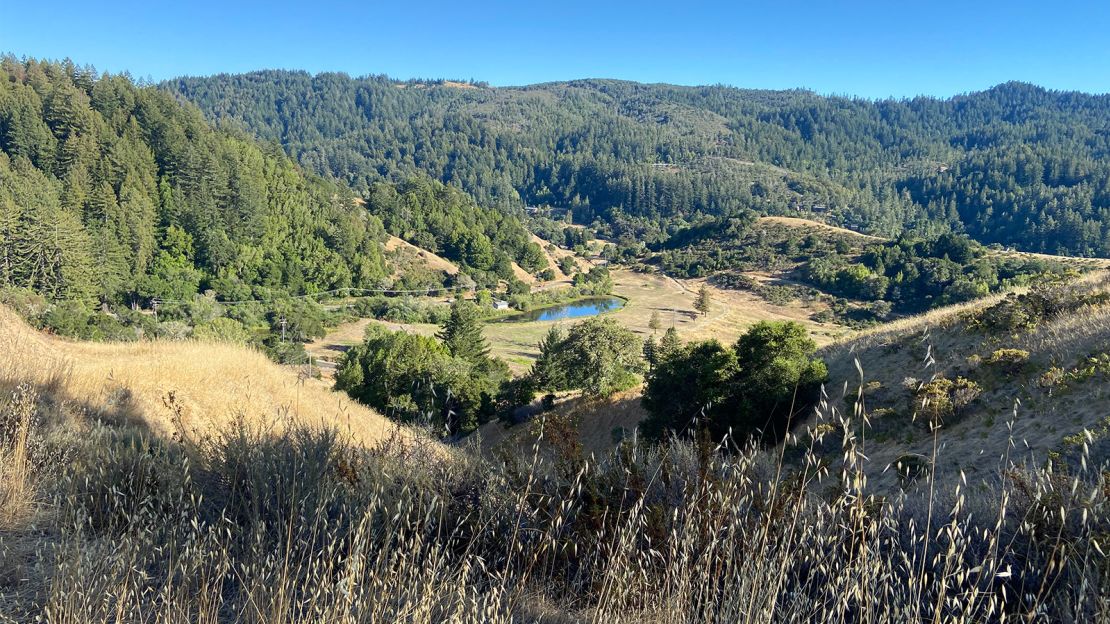
Rodriguez admits that initially TPL’s plan received some strong opposition from the public, especially from the golfers. But after efforts to involve locals in the design and opening hiking and biking trails in the area attitudes are changing. Now known as San Geronimo Commons, the site is a thriving center for the local community, he says.
Ocean Meadows, California
Further down the coast in Santa Barbara is another of TPL’s acquisitions: Ocean Meadows. The nine-hole course was built in the 1960s on the site of a wetland. To create it, developers filled the plain with 500,000 cubic yards of soil.
TPL purchased the 64-acre area in 2013 and started restoring the wetlands, removing the soil that had been added during construction and planting native vegetation. Since then, migratory birds have replaced birdies, and at least two pairs of threatened western snowy plovers are successfully breeding in the area’s mudflats.
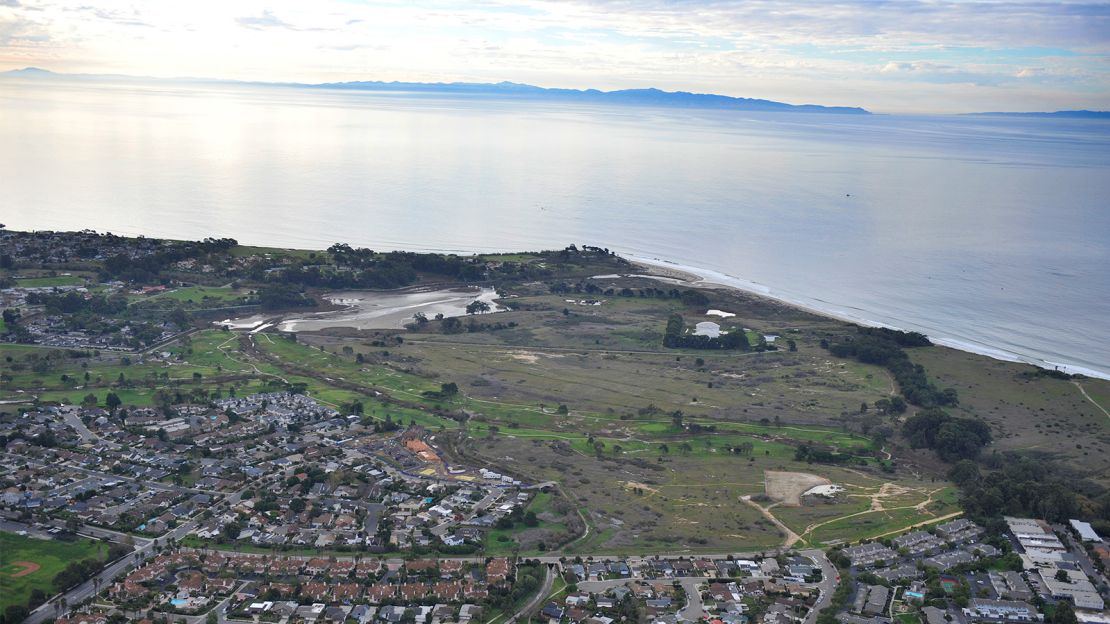
With the extreme shifts in weather patterns in recent years, especially in California, the benefits of having a wetland rather than a golf course have become clear, says Rodriguez. “Floodplains are able to kind of capture this water, protect infrastructure, protect other low-lying communities, and really let nature be an important solution,” he says.
Rancho Cañada, California
Most recently, TPL acquired Rancho Cañada, a 190-acre private golf course located in Monterey. It wants to widen and restore the riverbed and banks of the Carmel River, which runs through the course, helping to protect downstream neighborhoods from flooding.
Crucially, the site will become part of a wider network of protected land, enabling a wildlife corridor from Ventana to Fort Ord. “The ability to remove fencing and create much more cohesion between the previous golf course and the surrounding public lands, really builds that connectivity back,” says Rodriguez.
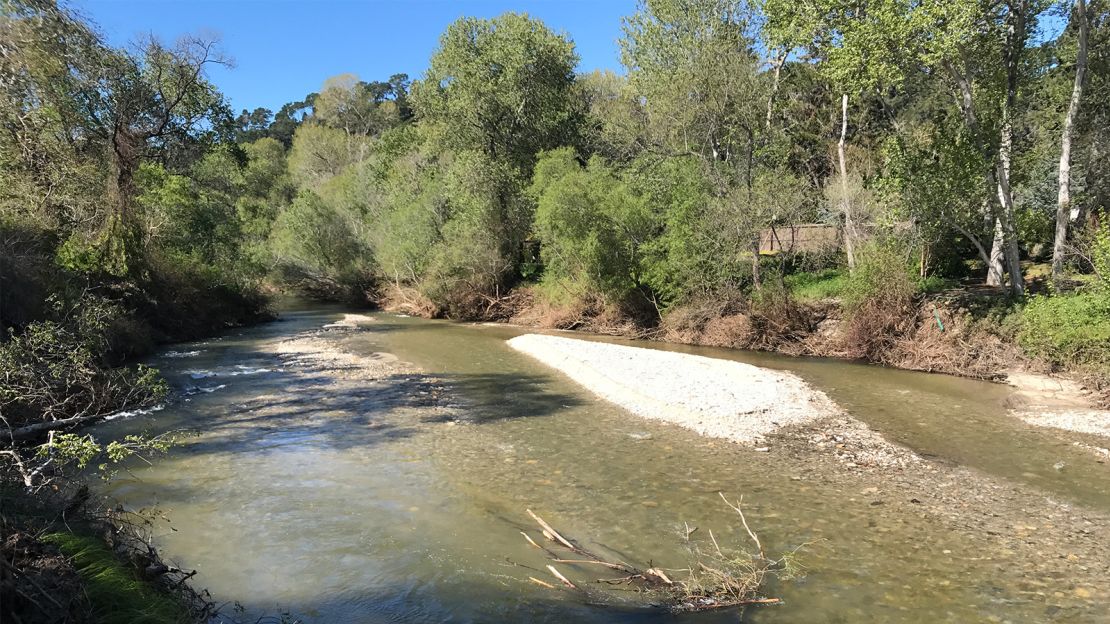
Cascade Valley, Ohio
TPL is not the only organization on a mission to rewild golf courses. In Akron, Ohio, Summit Metro Parks acquired the 195-acre Valley View Golf Course in 2016, returning it to its natural state. In doing so it connected three local parks and created 1,900 contiguous acres of green space.
The site has transformed, says Mike Johnson, chief of conservation at the nonprofit. Today, 90% of the vegetation is native, whereas the same percentage was non-native or invasive when it was a golf course, he says.
“Golf courses are harsh environments, and to create them the vegetation used is usually non-native … It doesn’t have value for our local fish and wildlife,” he tells CNN.
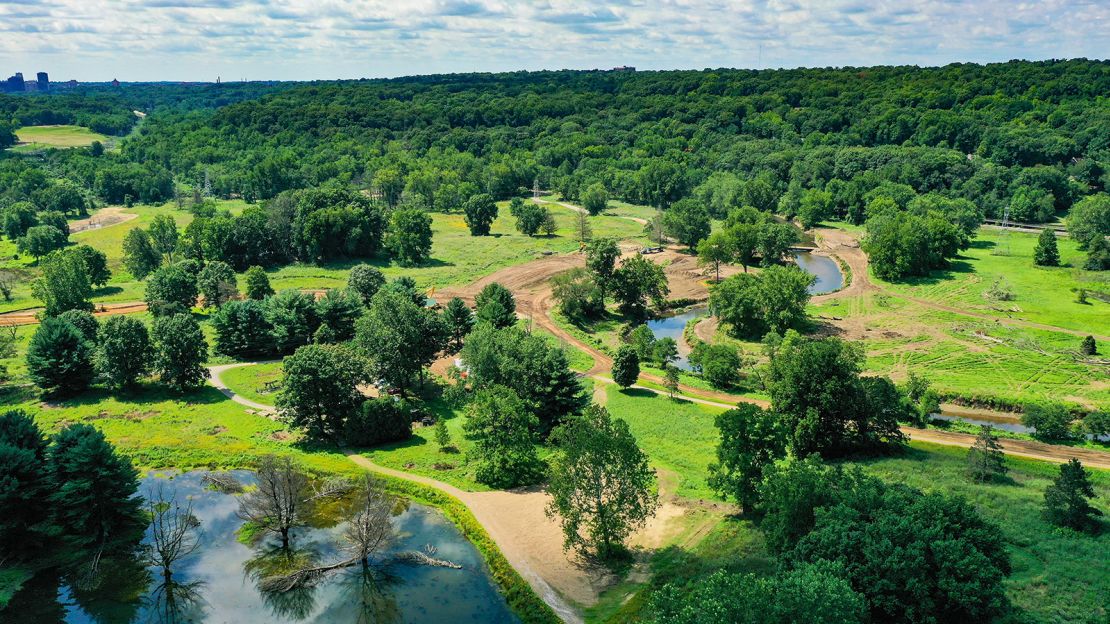
“We had to undo the golf course before we could restore the landscape,” he says, adding that they removed the levees, allowing the rivers and streams to run freely, and stripped out the turf and non-native trees before establishing a native cover of vegetation.
“The response from wildlife has been huge,” he adds. “Prior to our work, we documented about 200 species of plant and wildlife that were living on the golf course at the time we acquired it. Today we have documented over 900 species of fish and wildlife that have returned to this area.”
Frodsham, UK
Across the pond, in the UK, a similar movement is underway. Frodsham golf course in Cheshire, where top Liverpool footballers like Michael Owen once teed off, was bought by the UK’s Woodland Trust last year, with the plan to plant 40,000 native trees on the site.
“It’s still too soon to report any significant changes, but this summer more wildflowers were growing across the site because the fairways, greens, tees were not being mown as they would have been when it was being managed as a golf course,” says Neil Oxley, site manager for the Woodland Trust.
The site will contribute to The Northern Forest scheme, an effort to plant 50 million trees across 10,000 square miles stretching coast to coast from Liverpool to Hull. Currently, the area only has 7.6% woodland cover, but the initiative hopes to increase this to 20%.
In other areas of the country, local councils are repurposing unprofitable municipal golf courses to create more natural spaces. Erewash Borough Council is working with Derbyshire Wildlife Trust to turn the Pewit golf course into a nature reserve, after noting that few people were using it and it was a substantial drain on the council’s resources. Brighton and Hove City Council is rewilding the 220-acre Waterhall course to restore the area’s chalk grasslands.
Yalukit Willam, Australia
In the Melbourne suburb of Elwood, Elsternwick Park golf course has been transformed into a natural oasis, providing respite from the city both for wildlife and the local community.
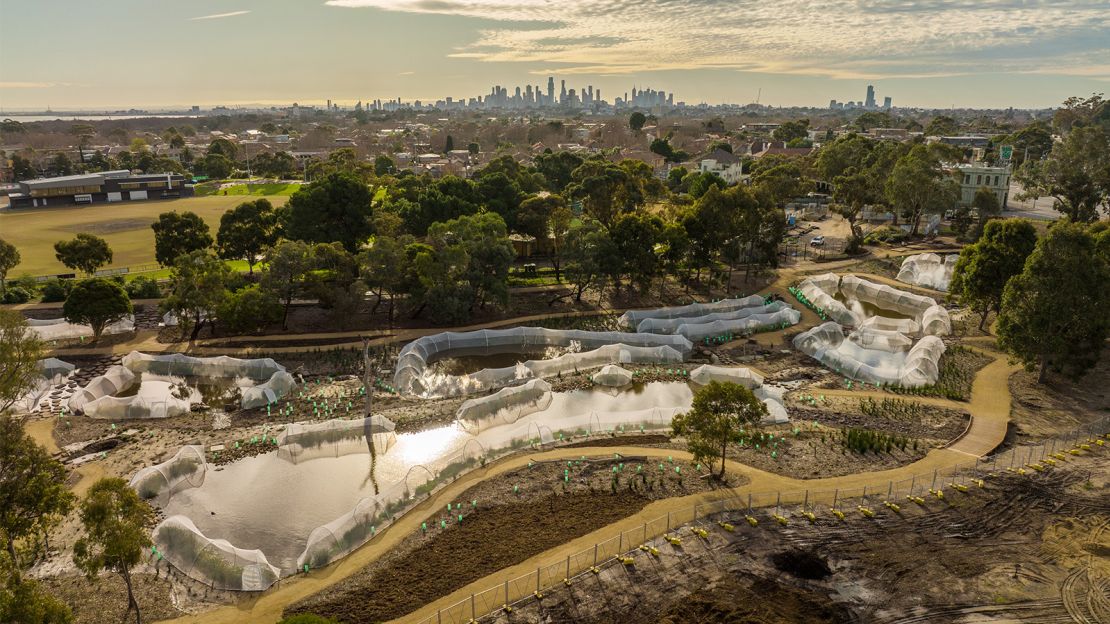
Bayside City Council, which decided to repurpose the course upon expiration of its lease, came up with a plan to create different habitats, from open water and swamp scrub to wetlands and woodland, that support a range of species. Although the project began in 2018 and is expected to take at least 10 years to complete, already the council has recorded more than 100 different indigenous plant species growing at the site.
The plan also includes a network of paths so that visitors can explore and learn about the urban ecology. In 2022, the site was renamed Yalukit Willam Nature Reserve to recognize the Yalukit Willam clan of the Boon Wurrung people, who traditionally owned the land.
"course" - Google News
October 27, 2023 at 03:31PM
https://ift.tt/BfH72oQ
Abandoned golf courses are being reclaimed by nature - CNN
"course" - Google News
https://ift.tt/60pDXVf
https://ift.tt/hap9Gu5
Bagikan Berita Ini














0 Response to "Abandoned golf courses are being reclaimed by nature - CNN"
Post a Comment